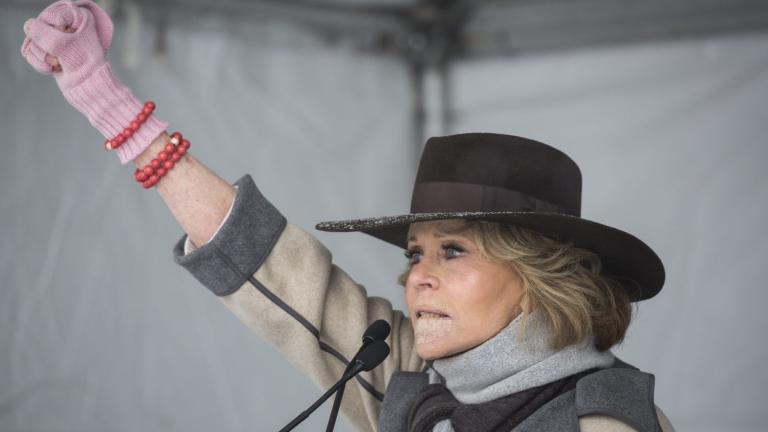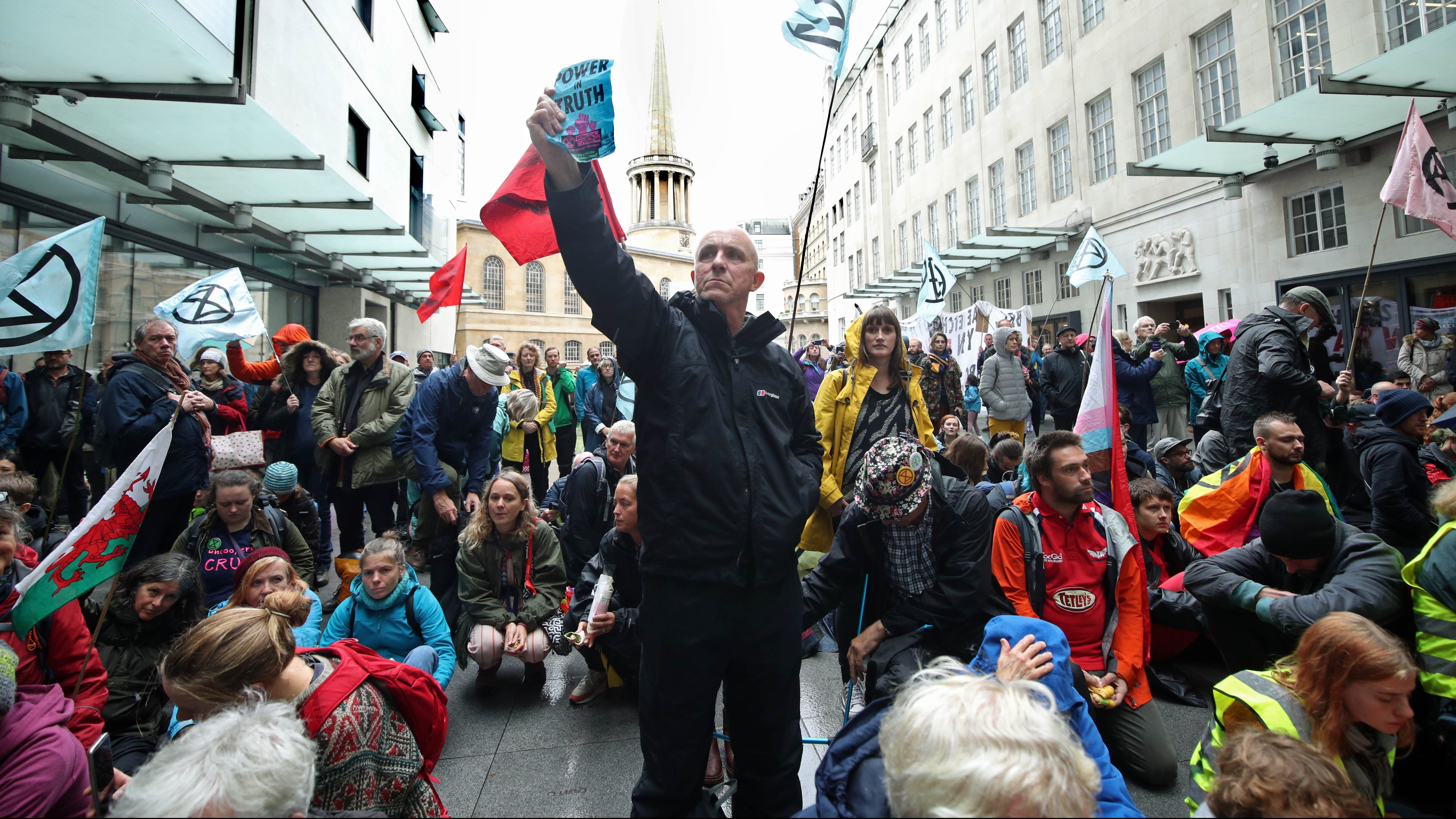This story was originally published by the Guardian and is reproduced here as part of the Climate Desk collaboration.
It was just a tweet, and whoever sent it probably didn’t think much about it. It was a sunny day in July and environmental activists had blocked the Strand with a big blue boat.
“Live from the royal courts of justice,” Extinction Rebellion London wrote. “It has been announced that all protesters arrested during the April rebellion will be prosecuted. We are asking the police and legal system to concentrate on issues such as knife crime, and not non-violent protesters who are trying to save our planet.”
For those with ears tuned to hear it, the dogwhistle sounded clear. Stop bothering us non-violent protesters; focus instead on those frightening inner-city neighborhoods, where black children carry knives.
“It was feeding into a racist narrative,” says Guppi Bola, an activist with the Wretched of the Earth, an environmental group that focuses on black, brown, and indigenous voices. “When those kinds of things come up, then of course you are not going to feel welcome.”
In less than a year, Extinction Rebellion (XR) has established itself as one of the U.K.’s highest-profile environmental campaign groups. Its mass civil disobedience protests have helped raise concern over green issues to a record high.
Its representatives have met government ministers and spoken to MPs. On Monday, it promises to start shutting down Westminster “for as long as it takes” to achieve its three main goals: for the government to tell the truth about the climate emergency; for the U.K. to cut its greenhouse gas emissions to net zero by 2025; and for citizens’ assemblies to devise policy to tackle the crisis.
But from the start XR has faced questions over its ability to reach out to diverse communities. Some critics go further, suggesting its tactics, its framing of key issues, and a series of communications missteps show a carelessness around issues of race — or even institutional racism.
As climate anxiety increases, XR says it has listened to the criticisms and is prepared to make changes in order to reach as many people as possible.
But why is the movement so white? Why is that a problem? And what can be done to change it?
XR’s lack of diversity is not unique to the wider environmental movement — a “white middle-class ghetto,” in the words of one NGO chief, with research in 2017 finding the “environment profession” — including workers at green NGOs — was the second least diverse of all sectors in the U.K., after farming.
So when a small group of activists got together in a Stroud living room last year to found a radical environmental movement, it was no surprise that they were white, or that they have gone on to create a movement in their own image.
With many of its key activists from rural or semi-rural areas, Extinction Rebellion rolls into town like the left wing of the Countryside Alliance. The protest culture of its core supporters is rooted in a new age hippy aesthetic of paisley robes, circus skills, camping, roll-ups, and psychedelic trance music.
“Outside of environmental think tanks and environmental organizations, grassroots organizing is often very isolating for people of color, particularly in the kinds of cultures or activities that are decided on,” Bola said.
“They lack inclusive cultures.” Protest groups often meet in pubs, which can be alienating for Muslims, she points out. Actions often involve “conditions people are not very comfortable with,” such as hiking or camping. Britons from an ethnic minority background are less likely to visit the natural world, research suggests “they might not have the kit.”
So while people from black and minority ethnic groups have been spokespeople for XR, and have taken part in actions, Metropolitan police statistics show that 9 in 10 of the 1,100 activists arrested in the group’s April protests in London were white — a city in which 4 in 10 residents are not.
A central plank of XR’s campaign strategy is to sacrifice as many activists to arrest as possible. Its supporters use a range of non-violent tactics to cause disruption and gain attention, then — in contrast to protest movements of the past — they allow themselves to be arrested without resistance.
They believe it is because of that sacrifice — the willingness to be arrested and go to prison — that people will take their message seriously. But it is a strategy that many black activists say they cannot adopt.
“The way they conceptualize the police and the state, and being arrested, alienates a lot of people of color, a lot of migrant people,” said Susuana Amoah, an environmental activist from Brighton who has run workshops on the green movement’s approach to race.
“They have so much faith in the system to be on their side and not send them to prison, or not send them to prison for long. And the bravery around that. People of color can’t do that. It won’t happen for us.”
In an open letter published in May, XR was challenged by the Wretched of the Earth to rethink its message and strategy to take into account “an ongoing analysis of privilege, as well as the reality of police and state violence.”
Bola helped to draft that letter. “I do remember the response from XR’s Twitter … which was ‘people of color are more harshly impacted by a police society and the judicial system and so it is the role of white people to stand up for them and take the lead,’” she said.
“I was like, ‘Um, I mean, I guess so.’ And I guess in a strategic, well-organized aligned action, that would involve people of color at the start of the decision-making process.”
Or, as another activist put it to the Guardian: “Instead of using your privilege to get arrested, how about using it to stop other people getting arrested?”
Initial messaging from the group eschewed issues of race or the idea of intersectionality — where environmental issues are considered in connection with those of race, poverty, class, and misogyny — as divisive and likely to alienate more potential supporters than they would attract.
There was an effort to present the environment issue as “beyond politics” and to use language that could attract those on the right as much as the left. As a result, no one apparently thought to raise the alarm when the committee drafting the group’s founding document — a “declaration of rebellion” read out in Parliament Square last November — decided it should raise fears of “mass migration”.
“There is a real threat of far-right xenophobia being fueled through the narrative of climate change,” Bola said. The fear is that such rhetoric could prefigure a populist turn to eco-fascism — an end that Gail Bradbrook, XR’s co-founder, has said is among her greatest fears for the future.
At the core of XR’s message is the idea that humanity is running out of time. “If we do not act now, we face extinction,” one early press release asserted. “At the very least we will witness the breakdown of society as we know it.” But as critics have pointed out, the very real effects of climate change and environmental destruction are already being felt by billions of people.
“Extraction of the Alberta tar sands has been happening for 50 years,” said Suzanne Dhaliwal, whose No Tar Sands campaign was the first in the U.K. to highlight the struggles of indigenous people in Canada.
“So when you talk about it as some future situation it means that the responsiveness to climate catastrophes and events isn’t even thought of as part of consciousness work. It’s all about white middle-class people protesting about something that might happen.”
Priyamvada Gopal, a University of Cambridge don and antiracism campaigner, said: “There has certainly been a perception among people of color that [XR] is white-led and sometimes inadequately cognizant of concerns around race, migration, empire, and so on.
“However, my sense is also that because it is a growing movement that is bringing different kinds of people onboard, particularly younger people, important discussions around race and geopolitics are starting to happen and that is welcome.”
One of those younger people is Daze Aghaji. She says XR has suffered from its lack of diversity and has made mistakes, particularly in its early stages, but she points out they were more the result of ignorance than malice. In particular, she says, critics have misunderstood XR’s mass-arrest strategy.
“The idea of being arrestable and non-arrestable, people think [these] are problematic terms, but they’re not,” said Aghaji. “For example, I’m personally non-arrestable, and this is a decision that should be made by every individual. I understand that, being a black woman, the police are not going to [treat me the] same as a 40-year-old white woman. So I’m not going to put myself in that position. And within XR you’re not forced to.”
According to Aghaji, more diversity can be found within XR’s youth wing. “XR Youth is really based on talking about indigenous communities, and the global south is our centering of what we talk about and how we express ourselves. And the way we connect to the climate emergency is very much in the line of more climate justice than the main XR.”
On Thursday, at a press briefing for XR’s planned mass demonstrations that start on Monday, activists from ethnic minorities were much more prominent. The event was opened by the Asian environmentalist Zion Lights, who spoke of the struggles of indigenous communities. Next week’s demonstrations will also include a “climate justice” bloc, where activists explicitly draw the connections between ecological destruction, racism, and inequality.
Others are also trying to force change from within. When the movement expanded to the U.S., activists there decided to include a further demand to the three that were laid out at the group’s inception in the U.K.: for a “just transition that prioritizes the most vulnerable and indigenous sovereignty [and] establishes reparations and remediation led by and for black people, indigenous people, people of color, and poor communities for years of environmental injustice.” Now activists are agitating to have that demand included in XR U.K.’s agenda.
Around the world it is the poorest and the blackest who are suffering the worst effects of the destruction of the natural world. More than 90 percent of pollution deaths occur in low- and middle-income countries, mainly in Asia and Africa. In England, it is the most ethnically diverse neighborhoods that are the most polluted.
Yet people of color in Britain remain less environmentally conscious than their white counterparts. Research last year by the National Union of Students showed that students who identified as other than white were less likely to engage with environmental issues, and less likely to have changed their behavior — such as using reusable cups — out of environmental concerns.
It is a tendency that Benjamin Zephaniah, the radical poet, musician, and activist, has encountered through his work in universities. “Most of the black students and the Asian students are saying my priority is just to stay safe and get on, and get this grade, and kind of better my family, and move on,” he told the Guardian. “It frustrates me because I want to tell them that it’s all connected. What good is your grade if you’ve got no planet?”
Zephaniah does not lay blame at the feet of climate activists for failing to reach out. “O.K., it’s a lot of mainly young white people getting together and they’re protesting in a way that’s culturally relevant to them,” he said.
“You can’t blame them for that. If they started growing dreadlocks and saying, ‘Yeah people, come join us,’ you would claim cultural appropriation. They are doing it how it’s culturally relevant to them, that’s why I’m saying we should take our steel bands down, we should take our sound systems down.”
Zephaniah points out that change is not going to come without people of color joining the demonstrations. “What would Malcolm X think of this? We’re sitting around, waiting for white people to invite us in the struggle.”
This article was amended on 9 October 2019 because an earlier version incorrectly referred to Priyamvada Gopal as an Oxford University don. She is at the University of Cambridge.




